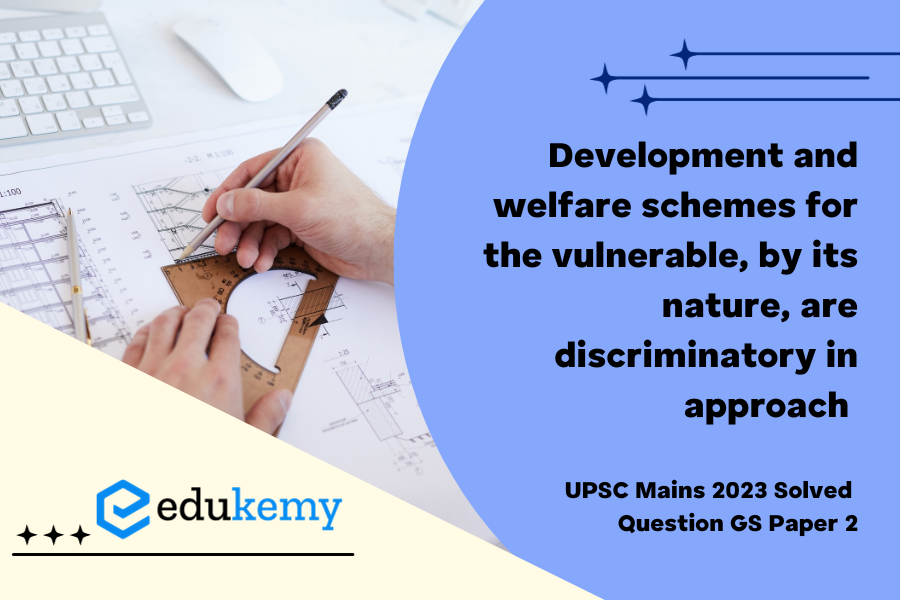The Mains 2023 GS Paper 2 featured a question inquiring whether development and welfare schemes, by their nature, exhibit a discriminatory approach toward the vulnerable.
UPSC Mains General Studies Paper – 1 Mains 2023
UPSC Mains Civil Services IAS Exam Question Paper – 2023
Contents
Introduction
The effectiveness and equity of Development and welfare schemes for the vulnerable are subjects of significant debate, while targeting specific groups, inadvertently perpetuating discrimination. The Constitution enables the state to provide for vulnerable groups- women and children (Article 15), socially and educationally backward classes (Article 15, 16). Besides, it mandates the state to strive for a ‘welfare state’.
Body
| Opinion I believe that while development and welfare schemes do focus on specific groups, like the economically disadvantaged or marginalised communities, it’s not inherently discriminatory. Instead, it’s a necessary approach to tackle societal disparities, aiming for equitable development. Nevertheless, we must rigorously assess the implementation’s fairness to prevent unintentional discrimination. |
The Nature of Development and Welfare Schemes:
Purpose and Objectives:
- Poverty Alleviation: Schemes focus on reducing poverty through aid, job creation, and resources, improving living standards for those in economic hardship. Ex: MNREGA in India reduces poverty by offering employment and financial aid to rural households.
- Social Inclusion: Programs promote inclusion for marginalised groups, ensuring equal access to opportunities and resources. Ex: The Scheduled Castes and Scheduled Tribes (Prevention of Atrocities) Act promote inclusion for marginalised groups, ensuring equal opportunities and resources.
- Healthcare and Education Access: Initiatives enhance access to healthcare and education, especially for those facing affordability barriers. Ex: Initiatives like the National Health Mission and Sarva Shiksha Abhiyan enhance healthcare and education access, especially in regions with affordability barriers.
- Gender Equality: Gender-based schemes combat disparities, empowering women and girls across various life aspects. Ex: The Beti Bachao, Beti Padhao campaign combats gender disparities, empowering women and girls through awareness and education.
- Employment Generation: Some schemes create jobs, especially in high-unemployment regions, aiding individuals in securing stable employment. Ex: PMKVY creates jobs in high-unemployment areas, enhancing employability through skill development.
- Housing and Infrastructure: Schemes provide housing and basic infrastructure, elevating living conditions and amenity access. Ex: PMAY offers housing and infrastructure support, elevating living conditions with financial assistance
- Environmental Sustainability: Programs support environmental preservation and eco-friendly practices. Ex: National Solar Mission and Swachh Bharat Abhiyan promote environmental preservation and eco-friendly practices.
- Social Welfare: These encompass various schemes, including aid for the elderly, children, and vulnerable families. Ex: Schemes like ICDS and NOAPS provide aid to the elderly, children, and vulnerable families, ensuring their well-being.

Uplifting Vulnerable Sections:
- Economically Disadvantaged: Targeting those in poverty or economic hardship with financial support and resources. Ex: PMGKY targets those in poverty with financial support and resources, aiding during crises.
- Marginalised Communities: Focusing on ethnic or religious minorities facing discrimination and exclusion. Ex: TSP and SCSP specifically focus on marginalised communities, addressing their unique needs and allocating resources to bridge disparities.
- Socially Oppressed: Advocating for the needs of socially oppressed groups, improving their well-being and rights. Ex: DAY-NRLM addresses the needs of socially oppressed groups, particularly women from self-help groups, advocating for their rights and well-being.
Legal and Ethical Frameworks:
- Constitutional Mandates: Many countries, like India, have constitutional provisions (e.g., Indian Constitution, Articles 14, 15, 46) promoting equality and non-discrimination, particularly in favour of vulnerable sections.
- Anti-Discrimination Laws: Nations enact anti-discrimination laws that bar bias in implementing schemes, addressing factors like race, gender, religion, disability, and age.
- Human Rights Instruments: International human rights agreements (e.g., Universal Declaration of Human Rights, Convention on the Rights of the Child) stress non-discrimination and equality principles.
- Transparency and Accountability: Legal and ethical guidelines demand transparent, accountable scheme implementation, preventing discrimination and ensuring intended beneficiaries receive support.
- Equality of Opportunity: Both legal and ethical frameworks underscore providing equal opportunities, irrespective of socio-economic background.
Case studies:
- India’s Midday Meal Scheme offers free meals to underprivileged school children,effectively reducing drop-out rates and enhancing child nutrition.
- Yet, challenges in execution, such as corruption and inadequate oversight, have occasionally led to discrimination against specific vulnerable groups.
Conclusion
Thus, it is necessary to view development and welfare schemes for the vulnerable as instruments for promoting equitable development rather than as inherently discriminatory. However, ongoing scrutiny and improvements in implementation are crucial to ensure that these schemes do not inadvertently perpetuate discrimination.
In case you still have your doubts, contact us on 8792740517.
For UPSC Prelims Resources, Click here
For Daily Updates and Study Material:
Join our Telegram Channel – Edukemy for IAS
- 1. Learn through Videos – here
- 2. Be Exam Ready by Practicing Daily MCQs – here
- 3. Daily Newsletter – Get all your Current Affairs Covered – here
- 4. Mains Answer Writing Practice – here


